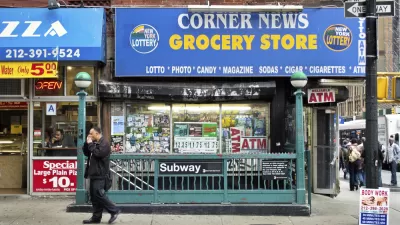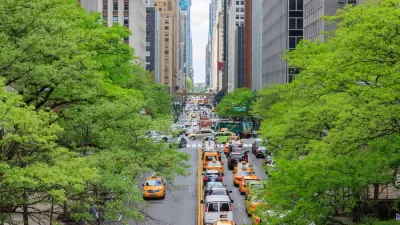A recent study claiming that transportation costs in Houston, among other expenses, raise the cost of living almost to the same level as living in New York City. Some took exception to the study's methodology.

A recently published report by the Citizens Budget Commission made news in urbanism circles for daring to publish the claim that living in Houston is almost expensive as living in New York City, due to the former's sprawling layout.
The study invoked vitriol among some online commentators (many tending toward the "market urbanism" spectrum of the urbanism debate) about the assumptions embedded in the study's methodology.
Connor Harris, writing for the Manhattan Institute, fleshes out those objections in a full-fledged attack on the Citizen Budget Commission's report. Harris argues that the study made several crucial mistakes, with more detail listed in the article for each: 1) Using metropolitan-area averages, 2) Counting taxes selectively, 3) Overlooking differences in quality, and 4) Making misleading income adjustments.
"Texas Monthly [which broadcast the study's findings] told a story that a lot of people wanted to hear: loosely regulated housing markets like Houston have long embarrassed ideological opponents of free markets who insist that only rent controls and massive public subsidies can provide affordable housing," writes Harris. "There is a ready audience for the argument that Houston’s affordability is a mirage. If you ever find an argument like this tempting, though, ask yourself: is it more likely that you’re mistaken, or that the millions of Americans voting with their feet are?"
FULL STORY: Is Houston Really Less Affordable Than New York?

Planetizen Federal Action Tracker
A weekly monitor of how Trump’s orders and actions are impacting planners and planning in America.

San Francisco's School District Spent $105M To Build Affordable Housing for Teachers — And That's Just the Beginning
SFUSD joins a growing list of school districts using their land holdings to address housing affordability challenges faced by their own employees.

The Tiny, Adorable $7,000 Car Turning Japan Onto EVs
The single seat Mibot charges from a regular plug as quickly as an iPad, and is about half the price of an average EV.

Seattle's Plan for Adopting Driverless Cars
Equity, safety, accessibility and affordability are front of mind as the city prepares for robotaxis and other autonomous vehicles.

As Trump Phases Out FEMA, Is It Time to Flee the Floodplains?
With less federal funding available for disaster relief efforts, the need to relocate at-risk communities is more urgent than ever.

With Protected Lanes, 460% More People Commute by Bike
For those needing more ammo, more data proving what we already knew is here.
Urban Design for Planners 1: Software Tools
This six-course series explores essential urban design concepts using open source software and equips planners with the tools they need to participate fully in the urban design process.
Planning for Universal Design
Learn the tools for implementing Universal Design in planning regulations.
Smith Gee Studio
City of Charlotte
City of Camden Redevelopment Agency
City of Astoria
Transportation Research & Education Center (TREC) at Portland State University
US High Speed Rail Association
City of Camden Redevelopment Agency
Municipality of Princeton (NJ)





























